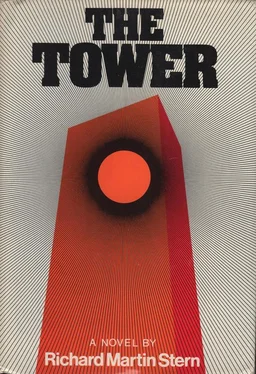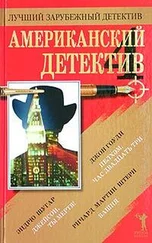From inside the room they could see Kronski’s strained face, and the gun he held, pointed, fired.
Against the chopper’s bellowing clatter, the sound of the shot was inaudible, but the fragile line itself was tangible for all to see. It shot twisting into the room, crashed against the far wall, collapsed in a writhing tangle on the floor.
The fire commissioner and three waiters pounced on the line and held it tight.
The helicopter lurched quickly away, paying out line as it went.
Someone cheered. It was contagious.
6:41–7:02
Patrolman Shannon, four stitches in his cheek beneath a fresh white bandage, was back at the barricade with Barnes. “You read about things like this,” Shannon said. “But did you ever think you’d see it?”
His gesture took in the plaza, the hoses and scurrying firemen, the smoke pouring out of broken windows on the building’s face, the plume of smoke near the tower’s top, and now high up the hovering helicopter, tiny against the immensity of the buildings.
“An Irish ghoul,” Barnes said. There was no rancor in his voice.
“There is,” Shannon said, “nothing like a good fire. Nothing.” He paused. “Oh, I know, Frank, I’m sounding like the bloodthirsty man I am not, but it is true. Why do people gather to watch? Because of the excitement of of the great leaping flames, a foretaste of Hell itself.”
“How are you,” Barnes said, “on a good juicy traffic accident? Bodies strewn around? Gore?”
“Oh, now, Frank, it is not the same at all. The one is man’s little foolishness. The other, this, is something—grand! Look there. Flames showing halfway up the monster structure! Do you see?”
“I see,” Barnes said. He paused. “And all I can think of is Gotterdammerung.”
“Put that into English, you black rascal.”
“Valhalla burning,” Barnes said. “The home of the gods burning to the ground.”
Shannon was silent for a few moments, still staring upward. “It’s blasphemous,” he said, “but I think I like it.”
The telephone hooked on his shoulder and the walkie-talkie on the desk directly in front of him, “So far, so good,” Nat said to the trailer in general. “They’ve made the messenger line fast inside the Tower Room. The chopper pilot is working back toward the Trade Center roof.”
Tim Brown said, “God be praised!” He took out the half-empty cigarette package, looked at it, and in sudden decision threw the entire thing into the wastebasket. “I’ll never have a better reason for quitting, ’ he said.
Patty sat quiet on a stool, watching, listening, smiling proudly.
Giddings said, “Half the battle won. The other half—”
“Agreed,” Nat said, his voice suddenly sharp, “but, goddammit, if we hadn’t won the first half, there wouldn’t even be a second half to try.” Then, into the phone, “Yes, Governor?”
“Assuming it is going to work,” the governor was saying, “what all is involved? Happily, I have never had to ride in a breeches buoy, so I know nothing about it. There is wind, considerable wind. Can a woman alone ride safely?”
“You stick your legs down through two holes,” Nat said. You’re inside a kind of sack. All anybody has to do is close his eyes and hang on.” He paused. His voice was solemn. “But you do have a couple of things to work out, Governor. Who goes in what order—”
“Women first. We decided that earlier.”
“Governor. The round trip, Trade Center roof to Tower Room and return, is going to take a little time. Say a minute. You have a hundred people up there, maybe half of them women. It’s going to take the better part of an hour just to get the women across, and another hour for the men. That’s a lot of waiting, and you’d better have the exact sequence—” He stopped at the sound of another voice in the office background.
The governor said, “Good for you, Jake.” And then, to Nat, “Senator Peters has anticipated you. I was afraid he was cutting out paper dolls. He is preparing numbered lottery slips instead.”
Nat nodded. He smiled. “Good.” He paused. “And somebody to enforce the sequence?” he said.
“That too is in hand.” The governor’s voice paused. “Two hours? That is your estimate?”
“Maybe less,” Nat said. “But slow and easy is the way, the only—”
The walkie-talkie crackled. “Oliver to trailer,” it said. “We’ve bent on the heavy lines. Well pay them out as they haul in. Tell them to take it slow, easy. When all this heavy line is out, they’re going to have a lot of weight to haul. More, because of the windage.”
“Will tell,” Nat said. “Hang on, Chief.”
He spoke into the phone again. “All set, Governor. Tell your men to haul away, and be prepared for a load before they get the job done.” He paused. “Good luck.”
“Thank you, young man.” The governor’s voice was tinged with’ anxiety. “You will continue to stand by the phone?”
“Yes, sir. And the walkie-talkie.”
“Bless you,” the governor said.
Nat laid the telephone on the blotter and leaned back in the desk chair. He caught Patty’s eye. She smiled.
Tim Brown said, “Will the structure stand? If it begins to collapse, we are going to have the damndest mess this city has ever seen.”
“I think it will stand,” Nat said. “If the fire gets completely out of control—”
“Man,” one of the battalion chiefs said, “it is completely out of control. All we’re doing is shoveling shit against the tide.” He paused. “And losing men doing it.”
“Then more windows are going to go,” Nat said. “And that aluminum siding won’t stand up indefinitely. But the structure itself isn’t going to collapse.”
“You’re sure?” Brown said.
Nat shook his head. “My best guess,” he said. “I can’t do any better than that.” His mind went off on a new tack. “With a forest fire,” he said, “you pray for rain.”
“Like they used to say in Boston,” Giddings said.
“Spahn and Sain and two days of rain. How much good would it do here?” He spoke to the firemen.
One of the battalion chiefs shrugged. “It would help. It would give them up there”—his raised head indicated the Tower Room—“a little more time, I’d think.” He paused. “But if they’re already getting smoke—” He paused again. “Two hours is a long time.”
Time was the essence, Patty thought. Time was the dimension against which all else had to be measured; within its framework, length, breadth, depth, those who waited their turn in the Tower Room would live or die. While we stand by outside that framework unable to help, she thought, and was reminded again of the vigil outside the Coronary Care Unit in the hospital.
She wondered how her mother was bearing up, and knew that at this moment Mary McGraw would be in church, on her knees, praying for the soul of Bert Mcgraw, and believing that her prayers would at least be heard even if not wholly granted. Faith has the power to move mountains? Maybe yes, maybe no. But certainly it did have the power to soothe and comfort.
And faith I have not, Patty thought for perhaps the first time with real regret. We have turned our backs on the old ways, many of us, but what have we taken in their place?
She was suddenly aware that Nat was watching her with concern, and she repeated the question aloud, wondering if he would understand.
“I don’t think we’ve taken anything,” Nat said. “We’ve substituted what we considered knowledge for belief and found that we don’t yet know enough to make the substitution work. Maybe we never will.”
His eyes searching her face asked a question, Patty thought, and she slid down from the stool to walk over and perch on the comer of the desk. “I’m all right,” she said. “Honest. Mother said she was going home to have a nice cup of hot tea and a good cry. Mine will come later too.”
Читать дальше










